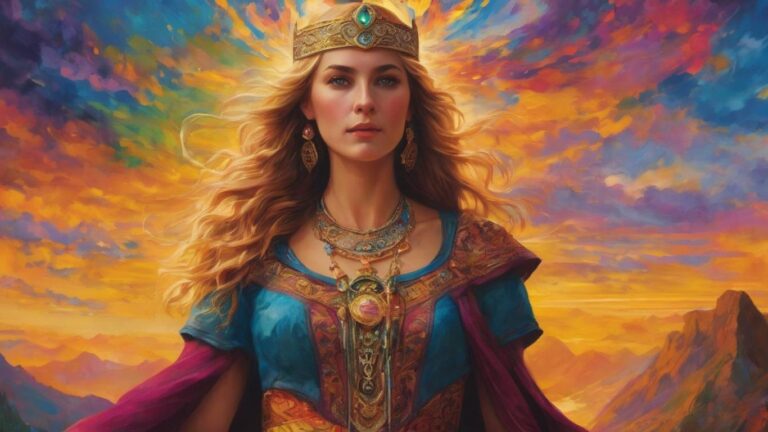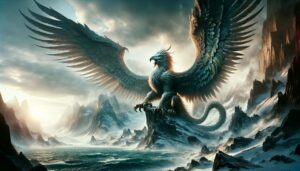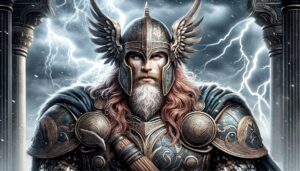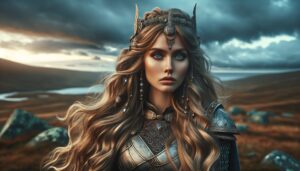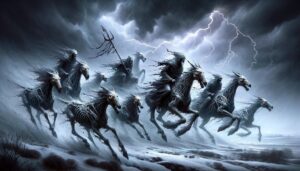Table of Contents
In the vibrant tapestry of Norse mythology, Frigg, the wife of Odin, stands as a regal figure and a paragon of wisdom. Often associated with love, motherhood, and the intricate threads of fate, Frigg holds a significant place among the Norse pantheon.
Origins and Lineage
Frigg, or Frigga, emerges from the mythical realms as a prominent member of the Aesir, the primary gods governing Asgard. Through her union with Odin, she weaves the intricate fabric of lineage, forming a bridge between the Aesir and the Vanir, two formidable pantheons within Norse mythology. This matrimonial alliance not only unites divine forces but also signifies a harmonious blending of powers.
In the celestial hierarchy of Asgard, Frigg’s essence radiates with the dual brilliance of motherhood and regal wisdom. As a mother, she embodies the nurturing spirit, guiding her son Baldr with unconditional love. The protective instincts of a mother goddess are woven into the very fabric of her being, symbolizing the tender yet resilient threads that connect the divine family.
Simultaneously, Frigg assumes the mantle of a wise queen, contributing to the governance of the cosmic order alongside Odin. Her insights into the mysteries of fate and destiny add depth to the divine council. Fensalir, her majestic hall, stands as a testament to her regal authority, a place where the destinies of gods and mortals intersect.
The Vanir, associated with fertility and prosperity, find their influence harmonized with the Aesir through Frigg’s lineage. This intricate interweaving of divine ancestry reflects the interconnectedness of Norse cosmology, where the union of powerful deities shapes the very foundation of the cosmos.
As the threads of Frigg’s lineage intertwine, a narrative unfolds, revealing a goddess who, in her divine essence, bridges realms, unites pantheons, and stands as a paragon of both motherly love and regal sagacity. Her origins and lineage, intricately linked to the cosmic fabric, showcase Frigg as a central figure in the vibrant tapestry of Norse mythology.
Queen of Asgard
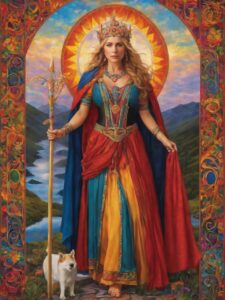
Motherhood and Family
Frigg, revered as the mother of Baldr, the radiant god of beauty and light, emanates boundless love for her cherished son. This maternal affection is palpable in the poignant myth where she endeavors to safeguard Baldr’s invulnerability, a testament to her devotion and protective instincts.
Frigg’s role as a mother extends beyond the celestial realm, bringing a touch of humanity to the divine narrative. Her interactions with Baldr reveal a mother’s deep understanding of her child’s essence, as well as the profound pain that accompanies the inevitability of fate.
Frigg’s attempt to shield Baldr from harm showcases not only her maternal love but also the inherent vulnerability of familial bonds in the face of cosmic forces. The tragedy that unfolds becomes a poignant exploration of the complexities of motherhood within the Norse pantheon.
As a mother, Frigg epitomizes compassion, nurturing, and an unwavering commitment to her family. Additionally, her role extends beyond the cosmic tapestry, resonating with the universal themes of love and loss. In the intricate threads of Norse mythology, Frigg’s portrayal as a mother adds depth to the narrative, showcasing a goddess who experiences the joys and sorrows inherent in the bonds of family.
Goddess of Wisdom
Frigg, the goddess of wisdom and foresight, stands as a beacon of divine intellect in Norse mythology. Her profound insights and strategic acumen contribute to the cosmic governance of Asgard. As a deity revered for her wisdom, Frigg possesses an intricate understanding of the fates woven by the Norns, allowing her to navigate the intricate web of destiny.
In her role as the goddess of wisdom, Frigg not only counsels Odin, the Allfather, but also influences the unfolding events in the Nine Realms. Her divinely inspired wisdom is a guiding force, shaping the destinies of gods and mortals alike. Frigg’s hall, Fensalir, becomes a sanctuary where cosmic threads intertwine, and her wisdom shapes the paths that gods and beings tread.
Frigg’s association with foresight adds a layer of complexity to her character, elevating her beyond the conventional roles of mother and queen. Her prophetic abilities afford her a unique perspective, allowing her to anticipate the ebb and flow of fate. This foresight becomes a crucial element in the cosmic balance, influencing the choices made by both gods and mortals.
As the goddess of wisdom, Frigg embodies the delicate interplay between knowledge and destiny. Her presence in the pantheon underscores the importance of foresight in navigating the complex tapestry of Norse mythology. Whether offering sagacious counsel to Odin or weaving the destinies of her divine kin, Frigg’s wisdom reverberates through the realms, leaving an indelible mark on the cosmic order of Asgard.
Symbols and Iconography
Frigg is adorned with symbols that encapsulate her multifaceted essence, weaving a rich tapestry of meaning within the cosmic order.
Spinning Wheel: At the heart of Frigg’s symbolism lies the spinning wheel, representing the intricate weaving of fate. Much like the Norns, the mystical weavers of destiny, Frigg’s role involves shaping the threads of cosmic events. The spinning wheel serves as a visual metaphor for the interconnectedness of past, present, and future, illustrating Frigg’s influence over the unfolding destinies of gods and mortals.
Queenly Regalia: As the queen of Asgard, Frigg’s regal attire and throne symbolize sovereignty and wisdom. Her royal presence in Fensalir, the majestic hall, echoes with the authority she holds alongside Odin. The queenly symbols embody a harmonious rule that contributes to the stability of the divine realm.
Maternal Imagery: Maternal symbols, such as nurturing hands and protective embrace, reflect Frigg’s role as a mother. Her deep connection with Baldr, the god of beauty and light, is evident in these symbols, portraying themes of maternal love and the lengths a mother would go to shield her child from harm.
Golden Key. The golden key, associated with Frigg’s control over access to certain realms or knowledge, signifies her wisdom and guardianship. It represents the divine authority bestowed upon her, allowing her to unlock the mysteries of fate and guide the course of events.
Bird Imagery: Birds, ravens, and swans symbolize aspects of Frigg’s character. Ravens align with her wise counsel, while swans mirror her maternal and regal roles.
These symbols showcase Frigg’s influence over the cosmic weave, regal prowess, maternal instincts, and profound wisdom shaping destinies.
Legacy and Cultural Impact

